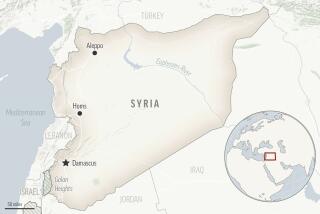Iraq Reportedly Planned Attacks on Neighbors
- Share via
AMMAN, Jordan — Iraqi President Saddam Hussein planned to invade Kuwait and Saudi Arabia this month but called off the attack when one of his top aides defected to Jordan, the defector said Sunday.
Lt. Gen. Hussein Kamel Majid, who was head of the country’s clandestine weapons program and is Saddam Hussein’s son-in-law, said he attended meetings of the Cabinet and the Revolutionary Command Council in which the invasions were discussed.
“All army units were informed to enter Kuwait and the eastern parts of Saudi Arabia,” he told the Associated Press in his first interview since an Aug. 12 news conference. “The move was reversed after . . . our departure.”
There was no way to independently confirm Majid’s claims. Because he is a newly converted Iraqi opposition figure, it would be in his interest to play up any hints that Iraq was planning such moves.
However, the fact that Majid was such a senior figure in the Iraqi regime adds to his credibility.
U.S. intelligence reports indicated “unusual” Iraqi troop movements in southern Iraq beginning last month.
“The latest movement of a large number of troops toward Basra [a city in southeastern Iraq near the Kuwaiti border] was aimed at entering Kuwait,” Majid said in the telephone interview.
Majid, who also was Iraq’s industry minister, was granted asylum in Jordan after defecting Aug. 8 with his brother Saddam Kamel Majid and their wives--both daughters of Saddam Hussein.
After the defections, Washington vowed to protect Jordan against any reprisals by Iraq and moved warships and military supplies toward the Persian Gulf.
Iraq has denied it is engaged in any unusual military activity, saying only that its armed forces have recently held several training exercises. It accuses the United States of whipping up hysteria.
Also Sunday, the top U.N. weapons inspector said that Iraq had provided the United Nations with “sound information” about its biological weapons program but that it was too soon to tell whether Baghdad had met the requirements for lifting U.N. sanctions.
More to Read
Sign up for Essential California
The most important California stories and recommendations in your inbox every morning.
You may occasionally receive promotional content from the Los Angeles Times.













